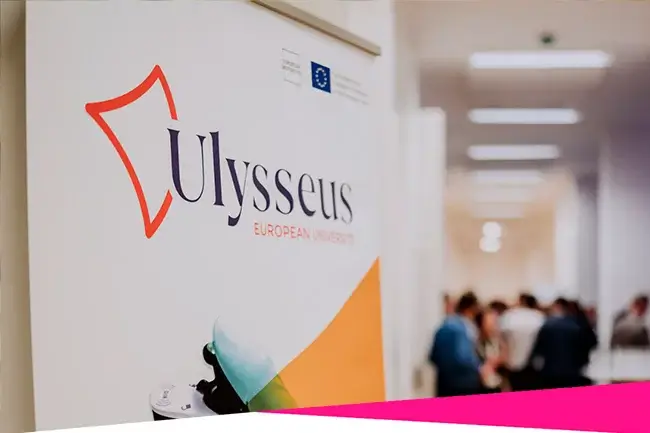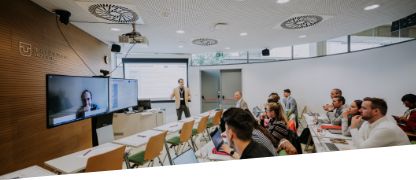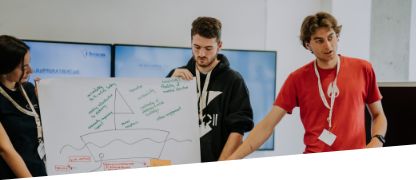COBRING
UlysseusCitiesMD Study Programme
-
Fundamentals
-
YEAR 1 – The Core
-
YEAR 2 – The «Flexible semester» & the «Getting into the sector semester»
Fundamentals
Fundamentals module consists is up to 24 ECTS, in pre-semester 1, compulsory for those students needing this complementary module.
This module is offered by the USE and will take place before semester 1 starts in a hybrid seminar format (on-site, online), taught by experts in the fields from the six Ulysseus partner universities.

YEAR 1 – “The core”
As the technical and technological training to be taught mainly during the first programme year, “The Core” comprises three main blocks with five modules:
The Green block

- Corresponding to the Green Module
- 9 ECTS, semesters 1, 2 & 3
- Compulsory
- Contents dealing with an environmentally friendly mindset, the 2030 agenda and SDGs, including environmental awareness, decarbonized systems and energy policies and regulation at the EU level, among other contents
- Hybrid seminar format (on-site, online)
- Taught by experts in the fields, both from the six Ulysseus partner universities, the public or private sector, and external experts
The Foundations of Smart Grids block

- Corresponding to the Smart Grid and Renewable Energy Production and Integration Module
- 27 ECTS, semester 1, compulsory
- Content: the most relevant aspects of electrical systems supporting cities
- This module will be offered by USE along the first semester in a hybrid format (on-site, online)
- Taught by experts in the fields mainly from USE and TUKE, with the participation of teachers/trainers from UCA and MCI, as well as associated partners and external experts.
The Smart block

- Once the basic structure of the city is set, the “smart” aspect needs to be developed.
- 3 modules, offered by USE and TUKE in a hybrid format (on-site, online):
- A common Optimization and Digitalization of Smart Cities Module (15 ECTS, semester 2, compulsory).
- Mobility and Transport in Smart Cities Module (12 ECTS, semester 2, elective, specialization elective track)
- Energy efficiency and Smart Buildings module (12 ECTS, semester 2, elective, specialization elective track)
- Taught by experts in the fields mainly from USE and TUKE, with the participation of teachers/trainers from UCA, as well as associated partners and external experts.
YEAR 2 – The "Flexible semester" & the "Getting into the sector semester"
The "Flexible" semester

In this semester, two fully elective modules are offered, from which students can select a personalized track containing courses from any
module:
- The Specialization Module (27 ECTS, semester 3, elective) is oriented towards a further specialization in smart cities by means of elective
courses. The module is offered by all university partners in a hybrid format (on-site, online), with the participation of associated partners and external experts. - The Transversal skills module (27 ECTS, semester 3, elective), containing a set of transversal training courses and activities dealing with Innovation, high level digital skills, communication skills, cultural courses, and languages, among others. A 6 ECTS course on entrepreneurship
is offered in this semester. Every Ulysseus IH has a joint incubator that will support this entrepreneurship training.
The "Getting into the sector" semester

A fourth semester focused on the labour market/research by means of two modules:
- The Traineeships module (15 ECTS, semester 4, compulsory). Two main traineeships options are available:
- In a specialized company or a public administration. In close relationship to the IH on Energy, Transport, Mobility and Smart Cities hosted by the University of Seville.
- In a research group of one Department of the six university partners, or a Research Center.
- The Master thesis module (15 ECTS, semester 4, compulsory). The masterthesis aims at providing answers to a realistic challenge project from an innovative and interdisciplinary point of view. It can be business (i.e., in apublic or private institution)- or research (i.e., a research department or research center)-oriented and combined with the traineeship period.
Funding

COBRING has received funding from the Erasmus+ programme of the European Union. The views and opinions expressed in this communication are the sole responsibility of the authors and do not necessarily reflect the views of the European Commission.






